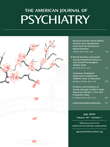Substance Abuse and Switch From Depression to Mania in Bipolar Disorder
To the Editor: The recent Systematic Treatment Enhancement Program for Bipolar Disorder (STEP-BD) article by Michael J. Ostacher, M.D., M.P.H., et al. (1), published in the March 2010 issue of the Journal, identified an association between current or past substance abuse or dependence in bipolar disorder patients and a greater likelihood for affective polarity switch from depression to mania, hypomania, or mixed state relative to when comorbid substance use disorders were absent (1). Consistent with this finding, previous naturalistic data from a study that I co-authored (2) demonstrated that a history of comorbid alcohol or substance use disorders conferred an approximate 7-fold increased risk in bipolar disorder patients for developing antidepressant-induced mania, regardless of cotherapy with antimanic agents. Using multiple regression, similar findings during antidepressant therapy were reported by Manwani et al. (3). In light of this prior literature, it would have been informative within the STEP-BD database to determine whether the presence or absence of antidepressant use mediated the relationship between a comorbid substance use disorder and affective polarity switch from depression. Although STEP-BD subjects with comorbid substance use disorders were less likely to receive an antidepressant than those without substance use disorders, this comparison in itself does not address the question of whether depressed bipolar subjects with a substance use disorder were more likely to experience a polarity switch in the presence rather than absence of an adjunctive antidepressant.
Elsewhere, the STEP-BD randomized acute depression pathway (4) showed no increased risk for mood destabilization with antidepressants among bipolar depressed patients overall, but that investigation has not yet examined whether there may be distinct bipolar subgroups who are prone to affective polarity switch during antidepressant therapy. Insofar as Dr. Ostacher et al. identify bipolar disorder patients with comorbid substance use disorders as especially vulnerable to mood instability, yet no less likely to recover from a depressive episode as those without substance use disorder comorbidity, the potential safety versus efficacy of adjunctive antidepressants in this particular subset of individuals with bipolar depression warrants further examination.
1 ; for STEP-BD Investigators: Impact of substance use disorders on recovery from episodes of depression in bipolar disorder patients: prospective data from the Systematic Treatment Enhancement Program for Bipolar Disorder (STEP-BD). Am J Psychiatry 2010; 167:289–297 Link, Google Scholar
2 : The association between substance abuse and antidepressant-induced mania in bipolar disorder: a preliminary study. J Clin Psychiatry 2002; 63:791–795 Crossref, Medline, Google Scholar
3 : Substance use disorder and other predictors of antidepressant-induced mania: a retrospective chart review. J Clin Psychiatry 2006; 67:1341–1345 Crossref, Medline, Google Scholar
4 : Effectiveness of adjunctive antidepressant treatment for bipolar depression. N Engl J Med 2007; 356:1711–1722 Crossref, Medline, Google Scholar



